
Forewords
An Introduction to c2c and its approach to Breaking Down Barriers
Breaking Down Britain’s Barriers
Benchmarking c2c’s Activity Against the Purpose Goals
Analysis
Regional Barriers to Opportunity Assessment
Recommendations


Forewords
An Introduction to c2c and its approach to Breaking Down Barriers
Breaking Down Britain’s Barriers
Benchmarking c2c’s Activity Against the Purpose Goals
Analysis
Regional Barriers to Opportunity Assessment
Recommendations

0.1. Rt Hon Justine Greening, Chair of the Purpose Coalition and Former Secretary of State for Education
The rail sector has long been an engine of economic growth, underpinning the productivity and prosperity of Britain. As a former Transport Secretary, I saw first-hand the critical role that rail plays in keeping our economy moving, connecting businesses, workers, and communities in ways that drive long-term development and social mobility.
Rail is not just a mode of transport; it is a lifeline for industry, trade, and opportunity.
Rail networks are fundamental to regional and national connectivity, ensuring that people and goods move efficiently across the country. The c2c network plays a particularly vital role in linking key commuter towns with London, providing a reliable and sustainable means of transport for thousands of workers each day. This connectivity supports businesses, drives investment, and improves economic dynamism - all of which are crucial as we look to the future.
Rail is one of the most environmentally responsible forms of transport, and its contribution to the UK’s Net Zero targets cannot be overstated. c2c’s network commitment to achieving Net Zero greenhouse gas (GHG) emissions in-line with Government targets is a significant step forward. By reducing carbon emissions, upgrading infrastructure with energy-efficient technology, and investing in modern rail solutions, c2c is leading by example in delivering a sustainable transport future.
In an era where the challenges of climate change and urban congestion demand innovative solutions, rail provides a low-carbon alternative that keeps our cities accessible, efficient, and economically competitive. As we continue to invest in the rail sector, we must champion innovation, prioritise decarbonisation, and ensure that rail remains the transport backbone of a greener UK economy.
The future of rail is one of growth, investment, and transformation – and as we move forward, it remains one of the UK’s greatest assets in delivering sustainable economic progress for generations to come.
Rail is one of the most environmentally responsible forms of transport, and its contribution to the UK’s Net Zero targets cannot be overstated.

0.2.
Nick Forbes CBE, Chair of the Breaking Down Barriers Commission and Former Member of Keir Starmer’s Shadow Cabinet
Rail is not just about transport – it is about people, places, and prosperity. For regions like those served by c2c, rail is fundamental to economic opportunity, social mobility, and community. Whether it is ensuring commuters can reliably access jobs in London, supporting local economies, or providing sustainable travel options – c2c plays an essential role in shaping a better connected and more resilient future.
The c2c network is a lifeline for commuters, many of whom travel into London each day for work, as well as a number of commuters travelling in the early hours to places like Basildon and Grays for employment. A reliable rail service doesn’t just benefit the individual –it supports businesses, fuels local economies, and enhances regional competitiveness.
The route is also critical for schools and young people studying across the region, especially in locations like Chalkwell, Southend East, and Upminster.
As we continue to expand services, upgrade stations, and invest in transport accessibility, we are breaking down barriers to economic participation and ensuring that no community is left behind.
Success in the rail sector is built on partnerships - with government, businesses, local authorities, and community organisations. By working together and bringing like-minded organisations together, we can drive investment, promote social inclusion, and create better transport experiences for all. Engaging with government and industry stakeholders ensures that policy decisions reflect real-world needs, reinforcing rail’s position as a strategic driver of economic growth and regional development.
Beyond the economic and environmental benefits, rail has a deep social impact. The investments c2c is making in station accessibility, safety initiatives, and community-driven projects are ensuring that rail is inclusive, secure, and welcoming for all.
As we look to the future, the role of rail in shaping local communities and supporting economic resilience has never been more important. c2c’s work in breaking down barriers, fostering collaboration, and investing in a connected, sustainable future is something to be celebrated and more importantly, something to build upon.
The railways are more than just tracks and trains; they are the foundation of thriving communities, a greener economy, pathways to education and opportunity, and a better future for all.
Beyond the economic and environmental benefits, rail has a deep social impact.

0.3. Rob Mullen, Managing Director, c2c Trenitalia
I’ve worked on the railway for over twenty years. I met my wife in the rail industry, I have made so many friends and met some incredible colleagues. Some of my most prized memories have come through the railway. I’ve driven trains, I’ve been a guard, I’ve helped on platforms, worked on big events, met with MPs and rockstars. I’ve helped with crises, storms, national emergencies, as well as been part of some of the country’s biggest celebrations. I’ve talked people down from the edge of platforms and helped them find their tickets, a seat, a platform or even just made them a cup of tea.
Young, old….every dynamic you can think of, the railway will likely have played a part in your life. It touches so many aspects of people’s day to day – work, rest and play. Like it has mine. We are intrinsically a fundamental part of our communities, a fundamental part of our economies and a conduit to growth.
At c2c Trenitalia, we view railways as more than just transportation; they are tools for economic investment, growth, and access to essential services like employment, healthcare, education, and training. Our commitment to communities is at the heart of everything we do, and we strive to make a positive impact on the lives of those we serve.
Railways are vital for connecting people and places and providing access to essential services. We are committed to recruiting individuals from diverse socio-economic backgrounds to ensure our workforce mirrors the communities we support. Our local hiring and recruitment drive ensures that our workforce is diverse and inclusive, representing the rich tapestry of our society.
Our Net Zero strategy is about more than just environmental sustainability; it is about creating a railway that supports healthier communities and long-term resilience. By partnering with local authorities and businesses, investing in station modernisation, and supporting economic growth through improved infrastructure, c2c plays a vital role in regional development. Planned improvements include new trains, expanded digital ticketing, and station upgrades at key locations like Fenchurch Street and Barking, enhancing both travel experience and accessibility
However, we believe we can do more. We can use that good base to be a good local employer by championing diversity, skills and sustainable careers. We collaborate closely with local partners such as Network Rail, British Transport Police, Essex Chambers of Commerce, and Southend United to align our efforts with community needs and goals. This ensures that we contribute effectively to promoting the Essex Thameside area as a great place to live, work, and visit.
Trenitalia c2c, known locally as c2c, is one of the UK’s most popular and top-performing train operating companies. Its award-winning services, which run through east London and south Essex (from London Fenchurch Street to Shoeburyness), support approximately 36 million passenger journeys each year, taking customers to work, places of education, shopping, leisure activities and on holiday.
Known for industry-leading punctuality and customer service, c2c holds the UK’s all-time records for on-time performance and has received multiple accolades, including the Golden Whistle in 2022 for the most punctual operator in London and the South East. Most recently, in 2025, c2c won Train Operator of the Year, one of the most prestigious awards in the industry.
Operating under a National Rail Contract, c2c has been part of Trenitalia S.p.A., the primary rail operator in Italy and a subsidiary of the Italian State Railways Group (FS Group), since its acquisition in 2017. This partnership has brought significant investment, driving innovation and operational improvements that enhance the passenger experience, improve service reliability, and support long-term environmental and financial sustainability. Trenitalia has also brought its international expertise and operational know-how to the UK, leveraging best practices from the Italian and European rail markets to strengthen service delivery and drive continuous improvement. As part of the FS Group, Trenitalia benefits from the Group’s extensive experience in rail infrastructure, logistics, and sustainable transport solutions, enabling c2c to enhance its service offerings and align with the broader goals of FS Group for integrated, efficient mobility.
With customer service at its core, c2c continues to invest in station and train improvements, simplifying ticketing structures, and improving accessibility. Most recently, it is refurbishing key stations like Fenchurch Street and Barking, introduced digital accessibility tools like the Passenger Assist and Accessibility Wayfinding apps, as well as being the first Train Operating Company to implement full route contactless technology - and continues to optimise service reliability.
A focus on sustainability is embedded in its operations, with a 10-year Net Zero strategy guiding efforts to reduce carbon emissions, improve air quality, and protect biodiversity. Investments in energy efficiency, waste reduction, and sustainable travel provisions align with c2c’s commitment to minimising environmental impact.
People remain central to c2c’s success, with new workforce roles planned for 2025/26 to support long-term operational improvements, such as the apprenticeship programme and relationships with charity organisations such as The King’s Trust, aimed at increasing industry diversity.
The business continues to strengthen partnerships with local communities and organisations like British Transport Police to improve safety and security across its network.
Looking ahead, c2c is focused on innovation and future growth, balancing cost efficiency with service reliability through fleet renewal strategies, timetable adjustments, and digital advancements in ticketing. By maintaining a sharp focus on safety, efficiency, and customer satisfaction, c2c remains a trusted and forward-thinking operator, delivering a resilient and sustainable transport network for passengers and communities.
c2c is deeply committed to breaking down the barriers to opportunity, ensuring that its services positively impact the communities it serves.
It integrates inclusion, accessibility, and sustainability into its operations while actively engaging with local stakeholders to boost social and economic development.
c2c values diversity in the workplace and is dedicated to building an inclusive culture where all employees feel empowered.
c2c regularly reviews policies, delivers training, and celebrates diversity throughout the year to improve awareness and inclusion within c2c. It is committed to promoting an inclusive culture through a wide range of initiatives that celebrate diversity, support employee wellbeing, and promote awareness across gender, race, faith, disability, neurodiversity, and LGBTQ+ communities.
As a local employer and service provider, c2c acknowledges the importance of strong community relationships. Many of its staff live locally and the organisation works closely with local businesses, councils, and stakeholders to support regional development and improve rail connectivity for passengers. It also maintains local connections with schools across its footprint, improving rail safety, awareness, and knowledge of careers.
On top of its membership of Essex Chambers of Commerce, c2c is committed to working more closely with business and industry leaders from across the county in a joined-up manner, helping to bring public and private sector organisations together, ensuring decisions and discussion around economic growth and the ongoing prosperity of Essex are made in a timely and coordinated way.
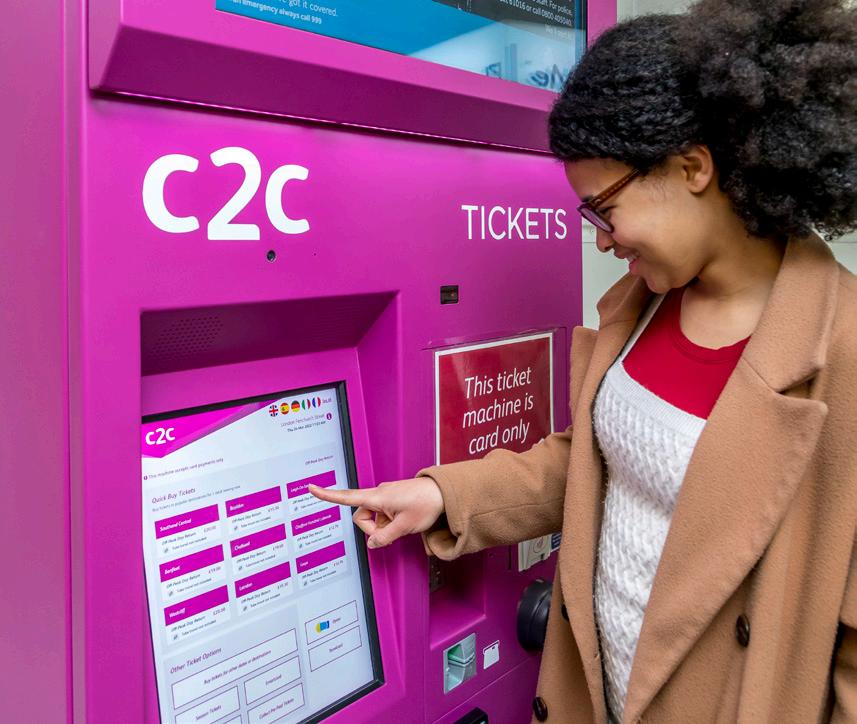
c2c is also aligned with broader sustainability goals – reducing emissions, energy efficiency, and responsible resource management.
c2c ensures passengers receive the best value through its Right Ticket, Right Price commitment, offering transparent pricing, automatic delay compensation, and fair refunds.
c2c was one of the first British rail operators to introduce innovative ticketing products, making rail travel more flexible and affordable for all, leading the industry with its smart technology. In 2014, it became the first train operator to launch a smartcard, allowing season tickets to be stored digitally. This was followed in 2016 by the introduction of the UK’s first smartcard-based Flexi-season ticket and automatic delay repay, making travel more flexible and convenient for passengers. In 2019, c2c introduced the pioneering PICO ticketing system, the first of its kind to integrate multiple sales channels into a single back-office platform. Continuing its commitment to innovation, c2c launched barcode ticketing in 2024 and has successfully launched expanded contactless payment across its full network in 2025, with over 50,000 people using the service each week.
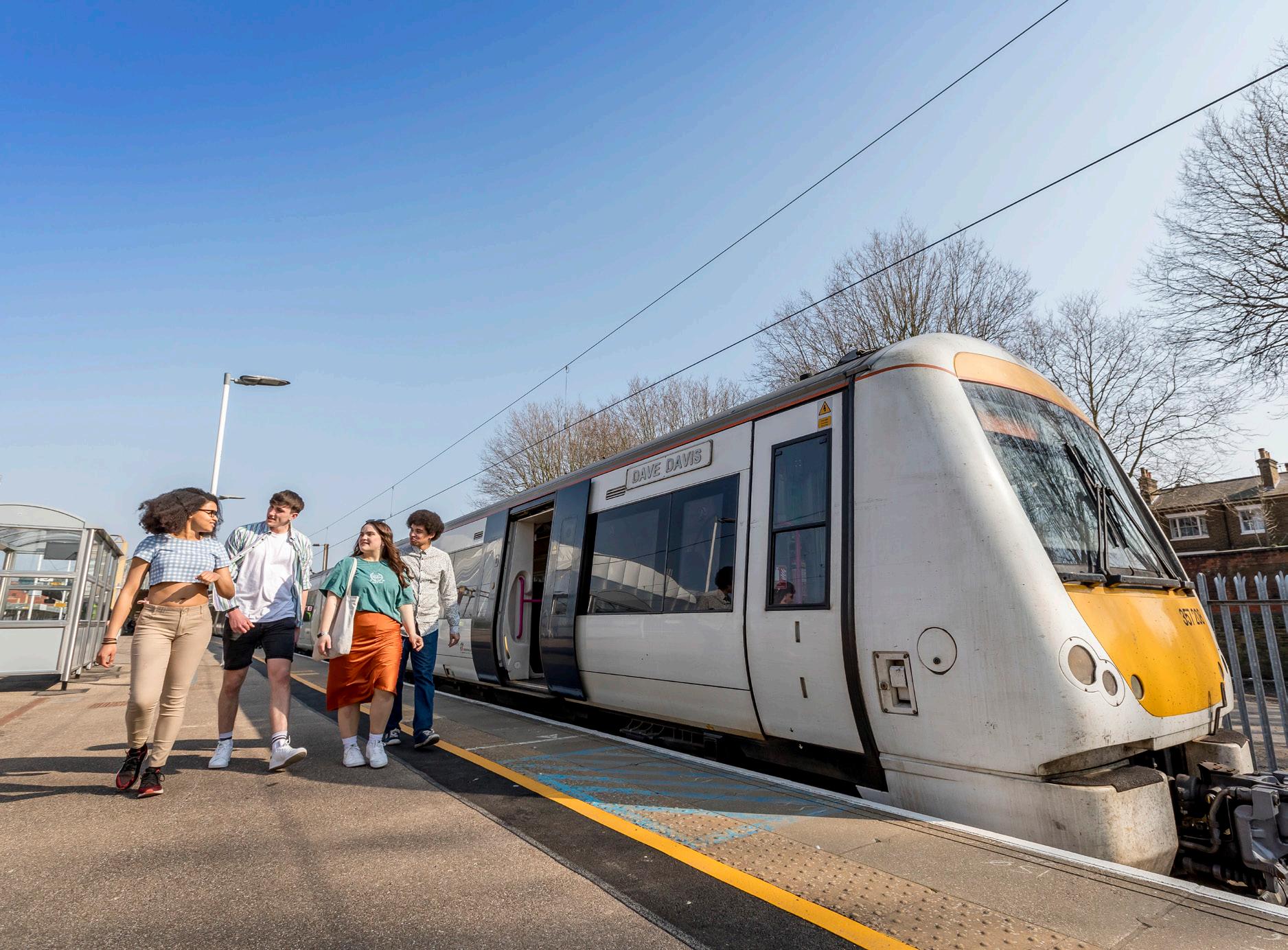
A growing economy and thriving society rely on resilient infrastructure. Central to this infrastructure is a reliable railway network.
The rail sector plays a crucial role in driving economic growth, social mobility, and leading innovation in the transport industry – particularly as the new government looks to establishing Great British Railways.
c2c is playing a key role in keeping Britain moving by delivering a safe, reliable, customer-focused, and innovative rail service. As a consistently high-performing operator, c2c has been widely recognised for its excellence in punctuality, fleet reliability, and passenger experience.
The creation of Great British Railways (GBR) represents a transformative step in the future of the UK’s rail industry. Designed to unify the fragmented rail system, GBR will bring together the oversight of track and train services, creating a more integrated and passenger-focused network. This reform aims to simplify ticketing, improve service reliability, and drive long-term investment in infrastructure and technology. Streamlining operations and placing a stronger emphasis on customer experience, GBR is set to improve efficiency, reduce costs, and drive sustainability across the sector. Its strategic leadership will also play a vital role in meeting the UK’s net-zero commitments by advancing electrification and supporting greener transport solutions.
The rail sector is central to the UK’s economy, contributing £43 billion to Gross Value Added. This substantial injection of capital also translates into £14 billion in tax revenue, in turn funding public services and further investments1.
Railways are not only vital for the economy, but also for job creation, employing over 710,000 people across various sectors. These jobs provide financial stability and drive customer spending, further boosting economic growth. A high proportion of c2c’s colleagues live across the organisation’s route, providing a valuable insight into the community and the regional culture.
What sets the rail industry apart is its significant multiplier effect. For every £1 invested in rail infrastructure and services, £2.50 is generated in income throughout the wider economy. This highlights the sector’s capacity to stimulate economic growth far beyond its direct contributions.
Rail transport also has a relatively low environment impact, accounting for under 1.4% of the UK’s CO2 emissions while facilitating 9% of passenger miles travelled. This makes rail a key player in promoting green growth and sustainable development – a key challenge for Britain. c2c is a key part of this sustainable transport ecosystem, using innovative tools like regenerative braking on its trains. When regenerative braking is employed, the current in the electric motors is reversed, slowing down the train, at the same time, the electric motors generate electricity to be returned into the power distribution system, powering the train.
Efficient railways also connect people and places, generating around £1.4 billion in timesaving benefits every year for commuters in the UK’s largest cities due to reduced road congestion. And by offering a viable alternative to car travel, carbon emissions are further reduced, supporting the UK’s broader environmental goals.
As one of the highest-performing Train Operating Companies (TOCs), c2c is delivering for its customers, ensuring reliable services that keep people and businesses moving. But the rail network does not operate in isolation. It is part of a wider transport ecosystem, interfacing with other TOCs, including Airport Rail Links and the London Underground, to create seamless connections for passengers. A truly integrated network provides essential links between urban centres, local communities, and key employment hubs.
Beyond passenger transport, the rail network also plays a critical role in supporting freight growth. Balancing the competing needs of passenger and freight services is vital to ensuring an efficient, high-capacity network that meets both economic and environmental objectives. The latest consultation document on rail reform highlights the importance of this integrated approachbringing together passenger and freight services within a coordinated transport strategy that maximises efficiency and sustainability.
Railways also improve social mobility, connecting people with opportunities, healthcare, and social activities, particularly in areas where car ownership is low. Twenty-two per cent of UK households do not have access to a car, and this figure rises to nearly two-thirds among the most disadvantaged households. One example of c2c’s work in this area is its Senior Rover Tickets, which allow those over the age of 65 to use trains all day for just £7, to encourage all individuals to use trains at a lower price, also offering promotional family tickets.
The rail sector is integral to the UK’s economic and social resilience. It drives economic growth, supports job creation, and promotes sustainable development. As the UK moves forward, prioritising investment in the rail sector, including support for open access operators, will be key to building a more connected and sustainable future with access to opportunity for all.
The Purpose Coalition measures organisations against a set of sector-relevant social impact criteria. The Purpose Goals outline 15 interconnected impact barriers to opportunity.
By drawing on expertise provided by academia and business, the Goals are designed to specifically address some of the unique challenges facing the UK.
The Coalition’s cross-party work brings together the UK’s most innovative leaders, parliamentarians and businesses to share best practice, and develop solutions for improving the role that organisations can play for their customers, colleagues and communities by breaking down barriers to opportunity.
The Purpose Coalition is chaired by Rt Hon Justine Greening, the UK’s former Secretary of State for Education, Transport and International Development; and led by Nick Forbes CBE, who recently served in Sir Keir Starmer’s Shadow Cabinet, and leads the Purpose Coalition’s work with the Labour Party; Rt Hon Anne Milton, former Minister for Apprenticeships and a Minister in the Department for Health and Social Care; and Lord Walney, former No 10 Advisor to Gordon Brown and Labour Member of Parliament for Barrow-inFurness.
The Goals were designed following Justine Greening’s experience – as Secretary of State for International Development – leading the UK’s delegation to the Convention of the United Nations (UN) that established the 2015 UN Sustainable Development Goals (SDGs). The Purpose Goals apply the SDGs in a UK context.
The SDGs as interlinked goals emphasised the interdependent environmental, social, and economic aspects of development and centralised the role of sustainability. At the time, Justine recognised how transformative a common set of accessible but ambitious goals could be in galvanising action to effect change. After leaving Government in 2019, Justine established the Purpose Coalition and Social Mobility Pledge with the intention of encouraging UK economic and social actors to improve social mobility in the UK.
The Purpose Goals focus on key life stages and highlight the main issues that need to be resolved to break down barriers to opportunity in the UK. The Goals are intended to guide ambition, provoke action, and measure progress.
c2c is active across all 15 Purpose Goals but is specifically focused on showcasing best practice and upscaling its social impact in key areas of strategic expertise as identified in this Impact Report.
3.1.1. Creating Pathways to Employment
c2c is actively breaking down barriers for young people by creating clear pathways into employment, training, and career progression. It engages with local communities, schools, and training providers to ensure that opportunities in the rail industry are accessible to all, regardless of background.
It also offers apprenticeships and early careers programmes, like its Train Driver Apprenticeship, giving young people hands-on experience and professional training that prepares them for longterm roles in the sector.
A key part of this approach is partnerships with Network Rail which provide mentorship and development opportunities for those interested in rail careers. Working closely with industry partners, c2c is able to offer tailored support and guidance to individuals looking to enter the sector, helping them to develop the technical knowledge and practical skills required for success.
One example of this partnership is c2c’s work with the King’s Trust. The King’s Trust, previously known as the Prince’s Trust, supports young people from aged 11 to 30 from all backgrounds access to employment.
c2c has partnered with The King’s Trust to offer the Get into Transport Support Services programme, a free, hands-on course designed to help young people gain essential skills and experience in the transport sector. Open to 18-30-year-olds, the programme provides practical customer service training in a live rail environment, giving participants the chance to work at ticket offices, gates, and on platforms to ensure smooth passenger journeys.
In addition to the King’s Trust programme, c2c has partnered with the education charity Primary Engineer to deliver STEM-focused rail projects in primary schools across Southend and East London. This equips teachers and pupils with resources to

build model trains, encouraging early interest in engineering careers and building long-term aspirations in the transport sector. Over the past year, this programme reached multiple schools and helped embed engineering into the curriculum.
Beyond industry experience, the course helps participants build confidence, improve their CVs, and develop interview techniques, all while receiving mentoring support for up to six months. Travel costs are covered, and additional financial support may be available for lunch and childcare. With only 12 places available, this is a valuable opportunity to kickstart a career in transport with one of the UK’s leading rail operators.
C2c’s wider community engagement programmes also play a vital role in introducing young people to career possibilities within transport and infrastructure. Working with schools, colleges, and universities, c2c encourages students to explore roles in engineering, operations, technology, and customer service. Through career talks, site visits, and internship opportunities, c2c actively promotes the industry as an attractive and accessible career choice.
3.1.2
Once within c2c, it ensures that career progression is based on skills, performance, and potential. Its development framework allows employees at all levels to progress within c2c, creating an environment where talent is recognised and nurtured.
Its key internal development work includes:
• Annual appraisals and tailored training programmes to support professional growth.
• Management development training, including EDI, performance management, and unconscious bias training to ensure fairness in leadership.
• Mentoring programmes, where experienced managers volunteer as mentors for emerging talent.
• Engagement in leadership conferences that provide networking, skills development, and community engagement opportunities.
As mentioned previously, c2c’s partnership with Network Rail strengthens development opportunities, ensuring that employees can progress through structured career pathways within the transport sector.
c2c is committed to upskilling its workforce and ensuring structured career progression for its employees. It has launched a state-of-the-art Driver Simulator Academy in Southend, providing new recruits with a realistic and controlled training environment. This cutting-edge facility enhances in-house training capabilities, equipping future drivers with the skills and confidence necessary to operate trains safely and efficiently.
These regular check-ins help identify opportunities for progression.
3.1.3.
c2c is supporting clear career progression across the organisation by creating a culture where development is regularly discussed and actively encouraged. Managers and leaders hold frequent one-to-one meetings with their colleagues, providing space for open conversations about career goals, development needs, and new ideas. These regular checkins help identify opportunities for progression and ensure individuals feel supported in their journey.
Employees are encouraged to contribute to the wider business, with any improvement ideas welcomed and considered.
Departments also create tailored development plans for individuals who express a desire to grow within their roles or move into new ones. To support longer-term progression, c2c offers a generous further education policy. This includes support for day release for professional courses, evening classes, distance learning, correspondence courses, and Open University study. The company also funds relevant courses and qualifications, removing financial barriers to upskilling.
Altogether, this joined-up approach ensures that every colleague has the opportunity to learn, grow, and progress their career at c2c.
Employees are encouraged to contribute to the wider business, with any improvement ideas welcomed and considered.
3.1.4. Ensuring Equal Opportunities in Career Growth c2c is committed to ensuring equal opportunities in career growth by creating pathways into the rail industry for people from all backgrounds.
Serving a diverse range of communities, c2c actively removes barriers to employment through initiatives like the Street to Seat programme, which enables individuals with no prior experience to train as drivers. Apprenticeships, work experience placements, and entry-level roles provide further opportunities for those looking to build a career in transport.
Inclusion extends beyond recruitment. Within the workplace, c2c embraces diversity in all its forms, ensuring that colleagues - whether neurodiverse, disabled, or from underrepresented groupsfeel valued and supported. Through promoting an environment where all employees can thrive,
c2c is not just providing jobs but building a workforce that reflects the communities it serves.
One example of this commitment is c2c’s introduction of its very first Accessibility and Integrated Transport Manager role, which was introduced during national Neurodiversity Week. This position is designed to drive accessibility improvements across the network while ensuring that transport services remain open and inclusive to all passengers. The week also featured Lunch and Learn sessions, giving employees the chance to learn from specialists and ask questions in a supportive environment.
The role works closely with key industry bodies like the Rail Delivery Group and the Department for Transport, advocating for equal opportunities and better service provision.
Good health and wellbeing are essential for individuals to reach their potential, yet health inequalities remain a major barrier to social mobility and economic participation across the UK. Without good health, people may struggle to engage in education, work, or community life, limiting both personal progress and wider social and economic development.
For those in work, wellbeing directly impacts their ability to grow, take on new challenges, and advance in their careers. Employers, particularly in essential sectors like rail, have a vital role in addressing these challenges by creating supportive environments that prioritise physical and mental health. Good health and well-being 8
As a key transport provider for some of the most deprived communities in the country, c2c understands the link between wellbeing and opportunity. Reliable, accessible rail services connect people to jobs, education, and healthcare, playing a direct role in improving health outcomes.
At the same time, as an employer, c2c has a responsibility to support the wellbeing of its workforce, ensuring that employees feel valued, protected, and equipped to deliver high-quality services. Embedding health and wellbeing into its operations, c2c not only strengthens its workforce but also contributes to a more resilient and connected society.
3.2.1.
c2c has reinforced its commitment to safety and security as the underpinning and continued aim of the company, right across its operations.
The business recently received Safeguarding on Railway Scheme (SRS) accreditation, achieving an 81% pass rate. This certification, issued after an audit by the British Transport Police, ensures that passengers and employees benefit from a safe and secure railway environment.
c2c is also now White Ribbon accredited as a company since February 2024. White Ribbon is the UK’s leading charity engaging men and boys to end violence against women and girls. Its mission is to prevent men’s violence against women and girls by addressing its root causes. As a White Ribbon Accredited organisation, c2c will deliver a comprehensive multi-year plan to transform its staff culture, systems, and the wider community it operates in. This strategy will help c2c eliminate attitudes and behaviours that lead to violence against women. White Ribbon Accreditation is an opportunity to make the workplace a safe place for men and women, and to upskill colleagues to become changemakers.
To qualify for accreditation, c2c established a steering committee and recruited ambassadors from around the organisation to champion the cause, and ensure it was doing all it can to act against gender inequality. c2c also set out an initial action plan to outline the actions that as an organisation it would take, including staff training and building awareness of the campaign.
A dedicated British Transport Police unit is permanently based at Benfleet station, improving security and incident response times. On top of this, all 26 c2c stations have been reaccredited under the Government’s Secure Station Scheme, further demonstrating c2c’s commitment to crime prevention and passenger reassurance.
To create a more secure and comfortable travel environment, on-train security teams, enhanced
CCTV coverage, and customer help points have been introduced across the network. Regular Revenue Protection events focus on specific areas and times to deter fare evasion and anti-social behaviour. These operations are intelligence-led, responding to realtime data and insights from frontline colleagues.
In addition, dedicated security teams are deployed at key locations, working alongside Revenue Protection Officers (RPOs) who target high-risk areas based on intelligence gathered from station staff. This strategic, data-driven approach enhances safety, reduces crime, and reinforces c2c’s commitment to maintaining a secure and welcoming environment for all. These measures also provide passengers with immediate access to assistance while helping to deter anti-social behaviour.
Alongside this work, c2c has deployed over 65 security personnel through Operation Serrano to target antisocial behaviour, protect young passengers, and improve staff safety at hotspot locations. This approach includes joint working with British Transport Police and strengthens safeguarding across the network.
c2c has extended its partnership with Amulet for another five years – with the option of two more. Over the years, the Amulet and c2c teams have raised thousands of pounds through various joint fundraising efforts, supporting charities such as Craig Tyler Trust, Samaritans and Railway Children. Local recruitment has resulted in an annual social value contribution exceeding £5 million, while community initiatives such as the Stamp Out Spiking campaign have improved safeguarding.
Staff training programmes more widely support safety efforts by equipping employees with the skills to respond to emergencies, assist vulnerable passengers, and maintain a culture of vigilance. Key examples include the provision of vital Samaritans training on Managing Suicidal Contacts. This specialised training equips frontline staff with the skills to identify vulnerable individuals, offer immediate support, and intervene effectively in critical situations.
Recognising that a healthy workforce is critical for long-term career success, c2c has made employee wellbeing a central focus. Its work is aimed at supporting both mental and physical health to ensure that employees can perform at their best while maintaining a positive work-life balance.
c2c prioritises employee wellbeing by offering a range of support services and initiatives designed to create a healthy, positive work environment. This is underpinned by a flexible working policy where hours, time and location can be changed to suit employees’ changing needs and circumstances.
It also offers a family friendly policy scheme, covering maternity, adoption, fostering, parental and shared parental leave, time off to care for dependents, and compassionate leave.
Another key component of c2c’s commitment to wellbeing is the presence of Mental Health First Aiders, who provide confidential support and guidance to employees experiencing stress or mental health challenges. These trained individuals offer a vital first point of contact, ensuring that staff have access to help when they need it most. Outside of emergency scenarios, the Employee Assistance Programme provides confidential support on a variety of personal and professional issues.
For frontline staff over the age of 55, annual medical assessments are provided to support long-term health monitoring. These medicals help identify potential health concerns early, allowing for timely intervention and ensuring that employees receive the care and support they need to remain fit and well at work, and contributing to wider critical preventative care.

Recognising and rewarding hard work is also key to fostering a supportive culture. c2c celebrates employee achievements through on-the-spot recognition, the Employee Star of the Month awards, and exclusive staff discounts via My Staff Shop.
Employees are also given access to fitness and mindfulness apps. These resources help staff manage stress, maintain a healthy lifestyle, and build resilience in both their personal and professional lives. C2c also promotes a culture of health and safety awareness through six-monthly safety briefings and interactive gym sessions, as well as delivering specialist Samaritans training for frontline teams –enabling staff to respond with confidence and compassion in critical situations.
Recognising and rewarding hard work is also key to fostering a supportive culture.
c2c has recognised the importance of transparent leadership and two-way communication in fostering a positive workplace culture.
As a result, it has seen improvements in leadership transparency and communication, as reflected in its year-on-year engagement survey improvements.
Its key engagement programmes include:
• Regular Teams Q&A sessions, allowing employees to directly engage with leadership and voice concerns or ideas. C2c also holds a full company briefing periodically called the ‘c2c Huddle’.
• Four-weekly puzzle sessions, designed to encourage collaboration, critical thinking, and informal learning, as well as walking clubs, end of the month gatherings and much more.
• Continued focus on improving engagement through employee feedback mechanisms, ensuring that colleagues feel valued and heard.
Prioritising open dialogue and continuous engagement, c2c ensures that employees are actively involved in shaping c2c’s future, reinforcing job satisfaction and long-term retention.
Encouraging innovation at all levels, c2c empowers its workforce to contribute to continuous improvement. This commitment to engagement ensures that employees feel heard, valued, and actively involved in driving positive change across the business.
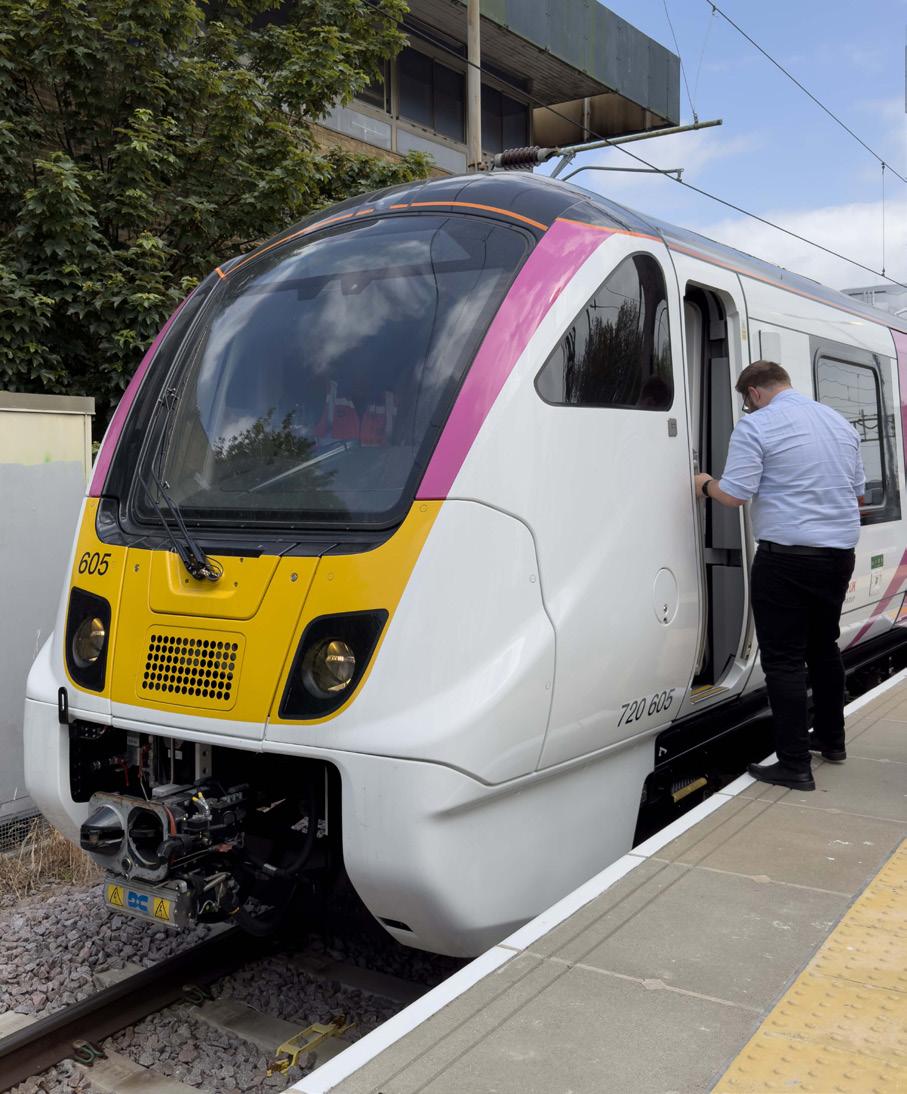
3.2.4. Promoting Wellbeing Externally c2c actively promotes health and wellbeing through community-driven initiatives.
Through its Community Engagement Fund, c2c provides £370 every period to local organisations and initiatives that make a positive impact across the network.
This funding helps community groups, charities, and grassroots projects improve wellbeing, enhance local environments, and support those in need. Investing directly in its communities, c2c is strengthening local connections and reinforcing its role as more than just a transport provider - it is a committed partner in driving social value and positive change.
The first-ever c2c Ultra Marathon, held in June 2024, attracted 250 runners from across the UK, raising over £27,000 for Railway Children, a charity supporting vulnerable children at risk in transport hubs worldwide. This is planned to go ahead again for 2025, with funding going to local charity Gold Geese.
c2c has embedded technology-driven solutions to improve collaboration and productivity across its teams.
The implementation of an action tracking system and Smartsheet integration within Microsoft Teams has allowed for real-time project tracking, enhanced accountability, and improved communication across departments. Over 900 actions have been recorded in the last nine months, with 700 successfully completed, demonstrating the effectiveness of these digital tools in managing workloads.
In providing employees with digital skills training and access to smarter workflow solutions, c2c is ensuring that its workforce is better equipped to operate efficiently in an increasingly digital rail industry. These tools not only reduce reliance on outdated manual processes but also empower employees to engage more effectively with data and project management.
The SharePoint Document Hub is also designed to support departments in managing and sharing key resources, working alongside its existing company tools.
3.3.3. Building Digital Literacy and Reducing Workplace Inequalities
c2c is committed to bridging the digital skills gap among its colleagues, ensuring that all employees - regardless of their role – can confidently engage with technology. The introduction of a structured meeting framework has improved information flow, making data and decisions more transparent and accessible across teams. Formalising meeting processes and improving digital communication, c2c is promoting a more connected and informed workforce.
The PMO also manages a corporate risk register, identifying digital transformation as a key priority for future-proofing operations.
As the rail industry continues to modernise, ensuring that employees at all levels have the necessary digital skills will be critical to sustaining long-term efficiency and growth.
3.3.4. Expanding Digital Inclusion Beyond the Workplace
c2c’s focus on closing the digital divide extends beyond its internal operations. The organisation is involved in projects aimed at improving digital accessibility within the wider community, like the King’s Trust initiative. This programme provides young people with digital skills training and employment opportunities, helping to break down barriers for those from disadvantaged backgrounds.
Additionally, c2c is investing in station redevelopment projects – like Ockendon and Barking – incorporating digital wayfinding tools, improved customer information systems, and AI-driven analytics to improve passenger experience. Integrating digital solutions into its infrastructure, C2C is helping to bridge the technological gap for both employees and the public.
More widely, in 2025, c2c launched British Sign Language (BSL) interactive information totems at Fenchurch Street and Southend Central stations. These screens provide realtime departure boards, journey planning, and station maps in BSL – significantly improving independence for Deaf passengers. This is one of the first UK deployments of BSL tech in rail travel. The trial consists of BSL totems at Fenchurch Street and Southend Central stations which, if successful, could be rolled out to further stations after the three-month trial.
It has also introduced an Accessibility Wayfinding App and improved Passenger Assist App in 2024, allowing users to plan step-free journeys and book station assistance in advance.
c2c’s network supports local economies by facilitating trade, tourism, and business investment, ensuring that communities remain viable places to live and work. Through continuously improving its services and working with partners to strengthen transport links, c2c is helping to build an infrastructure that doesn’t just connect places – it creates opportunities for the people who rely on it.
3.4.1.
c2c is acutely aware that transport infrastructure is fundamental to regional prosperity.
With rapid population growth and major housing developments emerging across East London and South Essex, the railway is crucial in sustainable urban expansion. Through ensuring that stations, services, and connectivity evolve in line with demographic changes, c2c is actively shaping the transport landscape to meet future demand.
Investment in station modernisation and capacity expansion is at the heart of c2c’s infrastructure strategy. The Fenchurch Street and Barking station redevelopment projects will improve passenger flow, accessibility, and service efficiency, ensuring that these key transport hubs continue to meet the needs of commuters, businesses, and visitors –as well as improving the retail offering to customers by providing new retailers, allowing passengers to both shop and travel.
Across the network, c2c is also prioritising ageing infrastructure upgrades to improve safety, reliability, and long-term performance. These improvements will create a seamless, future-proofed railway experience, reinforcing the railway’s role as the backbone of local and regional mobility.
c2c is not only modernising physical infrastructure but is also expanding digital services within stations.
The introduction of improved digital advertising, interactive customer information points, and smart ticketing solutions will modernise the passenger experience. Investment in station car parks and park-and-ride facilities will also improve multimodal
accessibility, allowing passengers to connect easily between different forms of transport.
A key part of this infrastructure investment involves working closely with local authorities, housing developers, and business groups.
Through its role as a regional leader, c2c is ensuring that capital investment in transport infrastructure directly supports urban growth, particularly in areas of economic expansion. Taking a community-led approach, c2c is prioritising railway stations that evolve into more than just transport hubs, but vital centres of economic and social activity.
For example, as part of the Government’s ‘Access for All’ scheme, c2c worked closely with Network Rail and contractor Octavius to upgrade Grays station. The site in Essex will become fully accessible with the addition of two new lifts which will allow station users to access both platforms via the existing stepped subway under the tracks.
At Grays station, step free access was previously available, however, passengers with mobility needs were required to exit the station and use the level crossing to the east to cross the tracks.
During busy times, the level crossing barriers close to allow trains in and out of platforms, adding additional time and inconvenience for those with restricted mobility, buggies or heavy luggage. The Grays Station ‘Access for All’ lift installation addresses a long-standing barrier for passengers with mobility needs, who previously had to use a busy level crossing outside the station to change platforms. This improvement will save time, reduce risk, and make the station fully step-free.
Critically, the lifts installed at Grays station are full ‘evacuation’ lifts, meaning individuals in need of the lifts are still able to evacuate the station if needed. This is especially important for those with mobility issues in the event that power to the station is lost. This is the first time these lifts have been installed on the UK rail network – with c2c leading the way.
3.4.3. Strengthening Community through Development
c2c is not just investing in railway infrastructure; it is also ensuring that its stations and services directly benefit local communities. Taking a community-first approach to transport planning, it is making rail travel more accessible, inclusive, and socially beneficial.
A key focus is on transforming railway stations into community hubs. Through creating vibrant, welcoming spaces, c2c is making its stations more than just points of transit – but destinations in their own right. This means integrating local businesses, expanding station retail options, and improving public spaces to improve the overall experience for passengers and local residents alike.
Accessibility improvements are also a top priority. c2c is working on station improvements that will make travel easier for passengers with disabilities, older individuals, and families with young children. This includes better wayfinding, improved step-free access, and improved station safety measures. c2c also offers comprehensive provisions for those who are neurodiverse and provides sunflower lanyards to passengers to show the company’s support.
It also maintains strong partnerships with local organisations, including sponsoring Southend United Football Club, Essex Chambers of Commerce, Essex Cricket, and local councils, to ensure that transport investments align with broader regional development goals. c2c has officially been announced as Southend United Football Club’s new ‘Front of Shirt’ sponsor for the 2024/25 National League season.
Actively managing ancillary revenue streams, c2c ensures that its services contribute beyond transport, integrating with wider community objectives. Partnerships include Ambassador Cruise Lines, Essex Chambers of Commerce, and local charities like Gold Geese.
These partnerships ensure that c2c contributes to social value beyond its network, strengthening the places it serves and making a lasting positive impact.
c2c’s infrastructure strategy is also closely linked to national economic priorities, such as the expansion of Tilbury Docks and the development of Essex Freeports.
c2c is supporting local economic growth through its partnership with DP World’s London Gateway by improving transport links to the Thames Freeport, improving connectivity for businesses, and enabling efficient, sustainable rail services. This supports job creation, boosts regional investment, and strengthens supply chain resilience through expanded port infrastructure and increased rail capacity.
The Lower Thames Crossing project will extend c2c’s customer base further into Kent and surrounding areas, creating new opportunities for rail expansion and improved service provision. The dependable new route will nearly double the road capacity over the river to the east of London, alleviating congestion and providing millions of people with more options for where they live, and work.
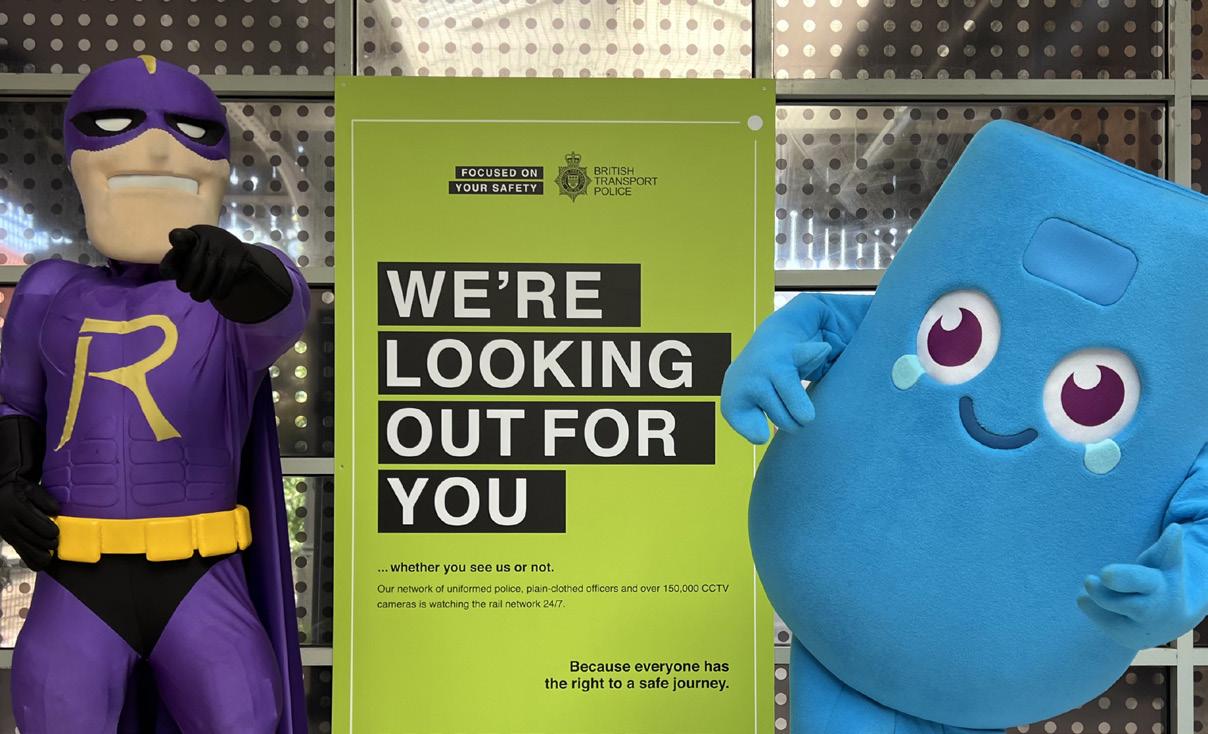
For colleagues, the strategy prioritises safety, operational efficiency, and professional development. The introduction of the Project Management Office (PMO) and enhanced management training ensures that employees are equipped with the right tools and support. A stronger focus on customer service training and digital transformation will also help future-proof careers within the company. By fostering a culture of continuous improvement and innovation, c2c ensures that its workforce remains motivated and well-prepared to meet future challenges.
For government and industry partners, achieving Net Zero enhances financial stability by increasing revenue through customer growth, cost efficiency, and commercial partnerships. Collaboration with government and industry partners is crucial for aligning with national sustainability goals and the evolving rail industry landscape.
3.5.2. Community and Stakeholder Engagement
c2c’s commitment to community and stakeholder engagement goes beyond providing transport – it actively supports local development, wellbeing, and economic growth. Through partnerships with local councils, charities, business groups, and education providers, c2c helps create opportunities that benefit the wider community.
Critically, in 2023, c2c launched a £173,000 ‘Committed to Communities’ investment fund to support local station-based projects. Through public consultations and community-led proposals, funded projects have included wellbeing gardens, public art, and water refill stations at stations.
To improve service delivery and maintain community engagement, c2c hosts regular stakeholder forums and customer panels. These discussions provide a structured platform for passengers, community leaders, and key stakeholders to share feedback, ensuring that their perspectives inform decision-making.
Using open dialogue from a wide range of perspectives, including its Passenger Panel and Passenger Association Groups, c2c can continuously refine its services, improve accessibility, and align transport operations with passenger needs. These forums also serve as an opportunity to talk about planned developments, policy changes, and long-term strategiesreinforcing transparency and accountability in service provision.
3.5.3.
Introducing an additional 190 off-peak train services per week, c2c is expanding access to employment, education, and leisure activities. This increased connectivity directly contributes to economic growth and social mobility across the communities it serves.
c2c places a strong emphasis on supporting local enterprises and charitable organisations. Through partnerships with business groups like the Southend Business Partnership and Essex Chambers of Commerce, it helps increase footfall to local businesses and boosts economic growth in the communities it serves.
Community events, such as the Southend City Jam and the Haven Heard art trail, provide platforms for engagement and highlight c2c’s role as an anchor institution.
As part of its wider community support, c2c partnered with The Song School in Southend to sponsor summer music classes for children, donate instruments, and fundraise through an “Estuary Walk” event in 2024. These activities help improve local wellbeing, provide creative outlets for young people, and build social cohesion.
On top of this, the first c2c Ultra Marathon in June 2024 raised over £27,000 for Railway Children, attracting 250 runners nationwide and highlighting the railway’s role in supporting vulnerable young people at transport hubs.
3.5.4. Revitalising Public Spaces
c2c is committed to revitalising public spaces by investing in urban renewal projects that create safer, more attractive, and well-maintained environments for passengers and local communities.
The renewal of the boundary wall at Southend Central car park has been a key step, which improves both safety and aesthetics, contributing to a more welcoming and secure public space.
c2c is also refurbishing station platforms and improving accessibility, ensuring that travel is seamless for all individuals, including those with mobility impairments. It is working with the Royal Society of Wildlife Trusts and the Bumblebee Conservation Trust to develop a 38-mile “bee corridor” along the route, supporting biodiversity and pollinator habitats on railway-adjacent land.
On top of infrastructure improvements, c2c is actively reducing its environmental footprint through comprehensive waste reduction and recycling programmes. It is targeting single-use plastics, increasing the recycling of materials like paper, metal, and glass, and promoting responsible waste management across stations and operational facilities. Clear signage, passenger engagement campaigns, and partnerships with waste management providers help to ensure these efforts are effective and widely supported.
It has also created two new wildflower meadow areas and expanded local biodiversity more widely, in partnership with Essex Wildlife Trust.
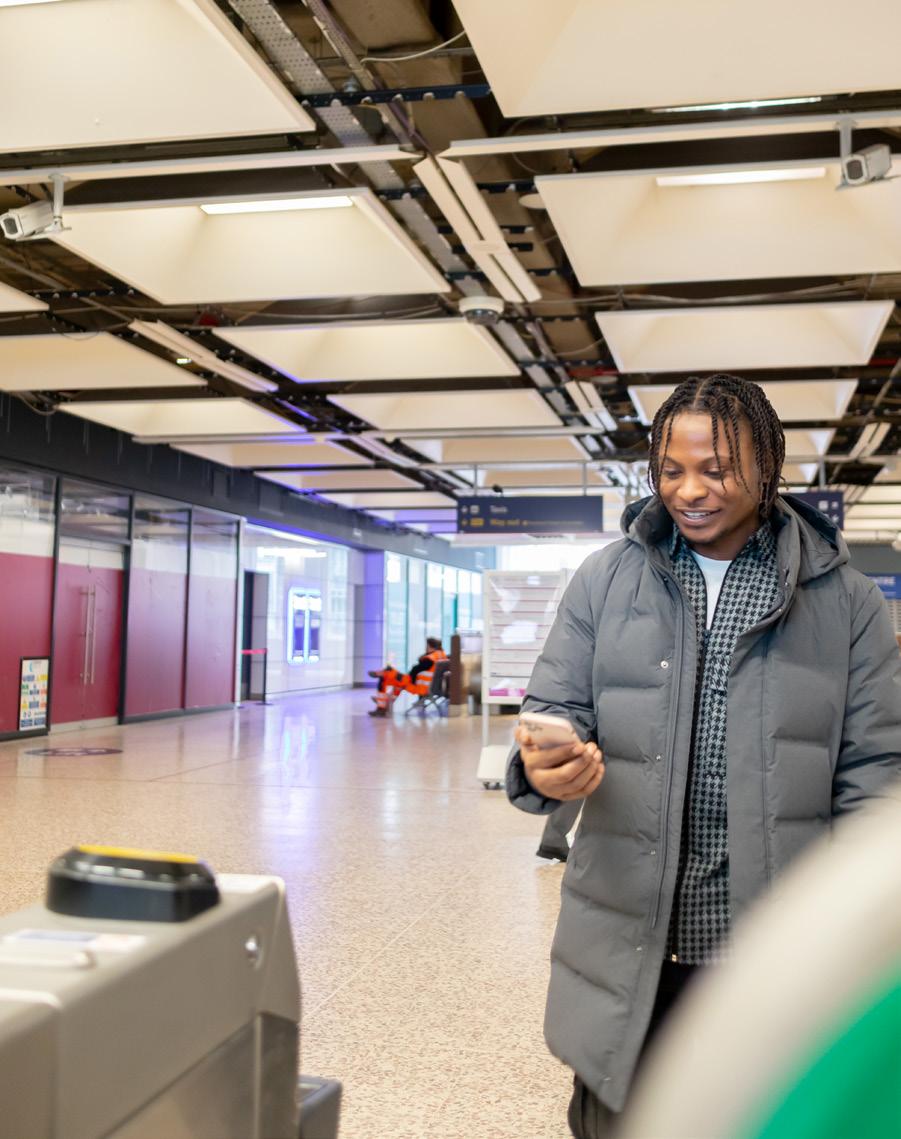
3.5.5. Measuring Success
c2c tracks key performance indicators like media reach, stakeholder sentiment, and brand perception to evaluate the effectiveness of its community work. Measuring engagement through customer participation in events and partnerships, c2c gains valuable insights into how its initiatives are received and where improvements can be made.
c2c is committed to revitalising public spaces by investing in urban renewal projects.
This data feeds into a continuous improvement cycle, ensuring that community efforts are not just assessed but actively refined. Regular reviews allow c2c to adapt its approach, expand successful initiatives, and respond to emerging community needs. Feedback from stakeholders and passengers directly informs future investments, ensuring that resources are directed where they will have the greatest impact.
Embedding this ongoing evaluation process, c2c ensures its community engagement remains meaningful, responsive, and aligned with the evolving needs of the areas it serves.
3.6.2. Diversity and Inclusion Forum
c2c is committed to promoting an inclusive and supportive workplace through its Diversity & Inclusion Forum, which brings together representatives from various business areas to drive meaningful change. The forum plays a crucial role in ensuring that c2c remains a workplace free from discrimination, bullying, and harassment, creating an environment where all employees feel respected and valued.
A key focus of the forum is to encourage open conversations, providing a safe space for employees to share their experiences and contribute to discussions on diversity and inclusion. Promoting dialogue and understanding, c2c aims to build a more inclusive culture where everyone feels heard and supported.
The forum also works to ensure that all employees have equal opportunities for career growth and progression. Identifying and addressing barriers to advancement, c2c supports a fair and transparent path for professional development, empowering individuals to reach their full potential.
The work of the forum will be supplemented by the organisation’s soon to launch Whistleblowing Policy and recently nominated Ethics Committee.
A whistleblowing policy benefits staff by providing protection from retaliation, ensuring confidential and clear reporting channels, and promoting a culture of integrity and accountability. It empowers employees to raise concerns safely, promotes early detection of issues, and aligns the employees with legal and ethical standards – strengthening trust, morale, and professional reputation across the workplace.
The introduction of a dedicated Accessibility and Integrated Travel Manager strengthens c2c’s commitment to making rail services more inclusive.
3.6.3. Improving Accessibility for All Passengers
c2c supports approximately 5,000 passenger assistance requests annually, ensuring that individuals with mobility impairments or nonvisible disabilities receive the support they need.
The introduction of a dedicated Accessibility and Integrated Travel Manager strengthens c2c’s commitment to making rail services more inclusive.
Ongoing investments in step-free station access, improved train designs, and dedicated assistance services aim to enhance the travel experience for individuals with disabilities, reduced mobility, or additional support needs. Infrastructure improvements like tactile paving, audio-visual announcements, and accessible ticketing solutions are implemented in line with national accessibility standards.
The introduction of interactive BSL information totems also improves c2c’s commitment to inclusive service, ensuring deaf passengers receive timely and accessible travel updates without relying on written English.
Virtually, c2c has added ‘Recite Me’ – a cloud –based web accessibility and assistive technology tool designed to help make websites more inclusive for people with a range of disabilities, learning difficulties, or language needs.
At c2c, continuous learning and professional development are a core part of the workplace culture. It offers colleagues a range of opportunities to pursue further education while working. For example, the Finance Directorate supports staff in gaining finance qualifications such as accountancy exams.
Beyond formal education, c2c runs a wide variety of training initiatives. These include regular training courses, Lunch and Learn sessions, and talks from guest speakers on key topics like neurodiversity. There are also frontline training programmes and leadership development schemes to ensure all teams are equipped with the right tools and knowledge to do their jobs effectively.
These efforts reflect c2c’s commitment to creating an inclusive environment and ensuring equal opportunities for personal and professional growth across the organisation.

Looking ahead, c2c is focused on:
• Implementing blind recruitment practices to remove bias and increase access to rail careers for underrepresented groups.
• Optimising recruitment and onboarding processes to handle applications more efficiently and attract a diverse talent pool.
• Expanding mental health and wellbeing initiatives to support employees throughout their careers.
• Strengthening career development programmes, ensuring that all employees have equal opportunities to progress.
• Updating key employee policies like its Code of Ethics, Compliance Policies, Conflict of Interest, Anti-Bribery and Corruption, and bringing in a leading Whistleblowing Policy.
More widely, industry strategies are increasingly focused on opportunity for all, particularly through Access for All (AfA) funding and improvements in independent boarding. AfA supports upgrades like lifts, ramps, and step-free access, prioritising stations in high-need areas. This boosts physical accessibility and promotes fairer access to jobs, education, and services.
Efforts to enable independent boarding –like level access and automated ramps –are improving but remain patchy due to inconsistent platform and train designs.
Overall, progress is being made, but continued investment and inclusive design are essential to create a truly accessible rail network for everyone.

c2c’s breaking down barriers strategy is rooted in an approach that places passengers, communities, and employees at the heart of its operations. Aligning innovation, infrastructure, and inclusion, c2c is actively removing the structural barriers that limit opportunity. The following themes highlight the cross-cutting best practices that underpin c2c’s work.
4.1. Access to employment and progression
c2c is creating clear, accessible pathways into the rail industry. Through apprenticeships, early careers programmes, and partnerships with organisations like The King’s Trust and Primary Engineer, c2c opens up rail careers to people from a wide range of backgrounds.
Internally, structured development frameworks, mentoring, and a strong culture of one-toone engagement ensure colleagues can build long-term careers, regardless of where they start. Activities like blind recruitment, the
Diversity & Inclusion Forum, and tailored support for neurodiverse colleagues reflect a clear commitment to fairness and representation in leadership and career progression.
4.2. Community-focused infrastructure
Recognising that infrastructure is about more than connectivity, c2c invests in its network to serve as an anchor for local regeneration and social mobility.
Stations are being transformed into welcoming, accessible community spaces, co-designed with local stakeholders and embedded in wider growth plans. c2c’s work with local authorities, schools, and charities ensures that transport investment supports long-term regional development.
Projects like the ‘Access for All’ lift installations and expanded off-peak services open up education, jobs, and leisure to more people, especially in under-resourced areas.
Using the Indices of Multiple Deprivation (IMD), c2c has partnered with The Purpose Coalition to map communities across its footprint that face the greatest barriers to opportunity.
The IMD is the UK government’s official tool for measuring relative deprivation, drawing on data from seven key domains:
These insights are used to:
• Guide targeted interventions.
• Collaborate with key partners.
• Address specific deprivation domains most relevant to each community.
• Target the Recommendations in Section 6 to those most in need.
For example: Barking & Dagenham ranks 2nd out of 317 for deprivation in Housing and Access to Services, reflecting significant barriers like overcrowding and poor access to vital services.
Each domain reflects an aspect of deprivation and feeds into an overall deprivation score, used to rank small geographical units known as Lower Super Output Areas (LSOAs). With each LSOA comprising roughly 1,000–3,000 residents, this enables fine-grained analysis of deprivation across England’s more than 32,000 LSOAs.
The IMD ranks each LSOA nationally. A lower rank indicates higher deprivation, with rank 1 being the most deprived. LSOAs are also categorised into deciles:
Decile 1: Among the 10% most deprived in the country. Decile 10: Among the 10% least deprived.
For example, Blackpool ranks 1st overall, marking it as the most deprived local authority in England. Averaged LSOA scores for each local authority give a clear picture of regional deprivation, helping to identify strategic areas for intervention and support.
This data-driven approach enables c2c to deepen its reach into vulnerable areas and tailor its access and service programmes accordingly.
The IMD looks at seven key domains, each showing a different kind of deprivation:
Income: measures the number of people with very low incomes, including those who struggle to pay for basics like food and housing.
Employment: measures how many people of working age are out of work due to unemployment, health problems, or other reasons they can’t control.
Education, skills and training: focuses on low school results, limited qualifications, and a lack of learning of training opportunities for adults.
Health deprivation and disability: checks how poor physical and mental health, or a higher chance of dying early, affects people’s lives in an area.
Crime: measures how often people and property are affected by crime like violence, theft, or vandalism in the community.
Barriers to housing and services: looks at how hard it is for people to afford housing or access important services like shops, schools, or doctors.
Living environment: assesses the quality of homes and the local area, including housing conditions, air quality, and road safety.
There is also an ‘overall’ measure, which combines the information from all seven domains to give a complete picture of how deprived and area is compared to others.
The map below provides a visual representation of The Purpose Coalition’s Barrier to Opportunity Assessment across c2c’s service area. This assessment identifies and highlights the communities along the c2c route that face the most significant challenges in accessing opportunities—such as employment, education, and economic mobility. The evaluation is based on multiple indicators, including the Indices of Multiple Deprivation (IMD), and helps to pinpoint areas where targeted support and interventions could have the greatest impact.

1. Deepen community partnerships through a Formal Community Rail Partnership (CRP) c2c already plays a central role in supporting the communities it serves. Through its Committed to Communities fund, sponsorship of local youth initiatives, and partnerships with charities such as Railway Children and The Song School, c2c is delivering real social value across its route. These efforts have helped turn stations into community assets and strengthened c2c’s reputation as a trusted regional partner.
To build on this foundation, c2c could go further by establishing a formal Community Rail Partnership (CRP). A CRP would provide a structured platform for long-term collaboration
with local authorities, community groups, and businesses.
It would help embed local voices into planning, expand community use of stations, and scale initiatives such as school safety sessions, station adoption schemes, and youth engagement projects.
As recognised by the Department for Transport, CRPs play a key role in promoting social inclusion and sustainable transport. Formalising this approach would reinforce c2c’s commitment to place-based development and ensure that the benefits of rail investment are shared more widely.
2. Strengthen digital inclusion by expanding passenger-facing technology and skills support c2c has taken strong steps to improve digital accessibility, both for customers and colleagues. The introduction of strategic accessibility improvements across its stations demonstrates a genuine commitment to inclusive digital design. Internally, the creation of the Project Management Office (PMO) has improved digital systems and streamlined information-sharing across the business.
To ensure that all passengers can benefit from these digital advancements, c2c could extend its focus on digital inclusion beyond infrastructure.
One opportunity is to offer “digital travel support” at key stations - pop-up help desks or workshops where staff or trained volunteers assist customers with smart ticketing, journey planning apps, and accessibility tools at stations where there is not a ticket office.
This could be particularly valuable for older passengers, those with limited digital confidence, or people new to rail. Partnering with local colleges or community tech groups could extend reach and visibility. Through making digital access support more visible and hands-on, c2c can further reduce barriers to travel and promote digital confidence among all customers.

c2c has laid strong foundations for internal accountability through its engagement surveys, action tracking system, and sustainability and social value reporting.
5. Integrate impact measurement to track progress and improve accountability
c2c has laid strong foundations for internal accountability through its engagement surveys, action tracking system, and sustainability and social value reporting. It has also begun to explore how social impact and community outcomes can be embedded more deeply into planning and reporting.
To take this even further, c2c could develop a clear and accessible Social Impact or Breaking Down Barriers Dashboard.
This would bring together key metrics – the number of apprentices supported, training hours delivered, CO2 emissions reduced, accessibility upgrades made, and pounds invested in community projects.
Publishing these results annually or quarterly would offer greater transparency and allow for clearer reporting on progress against the Purpose Goals. Importantly, it would also provide a structured feedback loop to inform future investment and ensure resources are directed where they have the greatest impact. A visible dashboard could also help celebrate success and demonstrate the cumulative impact of c2c’s commitment to social value across the network.
Closing Remarks
Rt Hon Justine Greening, Chair of The Purpose Coalition and Former Secretary of State for Transport:
This report illustrates how c2c is breaking down the barriers to opportunity, using its unique experience, expertise and partnerships to deliver positive impact for its passengers, its staff and the communities it serves on vital commuter routes between East London and South Essex.
Of course, its focus is on delivering a better passenger experience for all. But, as the report shows, it plays a far wider role through its encouragement of regional and national connectivity, provision of more sustainable transport options and support of local economies. It is also instrumental in making a deep and lasting social impact beyond the economic and environmental benefits it delivers.
c2c's activities, as detailed in this report, highlight its ambition to do the right thing, lifting up communities and the people who live in them. As a truly-purpose led organisation, it also recognises it has the potential to go even further, building on its already significant achievements. By focusing more closely on those that need the most support, as outlined in the recommendations and measuring its progress, it can make a tangible and long-term difference.
I hope this report is a useful tool for others seeking to similarly turbocharge their social impact journey. I know that with the establishment of Great British Railways c2c will continue to play a key role in the UK rail sector, driving innovation and growth alongside transformational change.

The Purpose Coalition campaign is proudly run by This is Purpose, part of Crowne Associates.
Copyright © 2024. Crowne Associated Ltd is a corporate affiliate member of the Chartered Institute of Public Relations, and reports lobbying activities to The Office of the Registrar of Consultant Lobbyists, in line with the Transparency of Lobbying, Non-Party Campaigning and Trade Union Administration Act 2014. You can read our Code of Conduct at crowneassociates.uk/code-of-conduct.